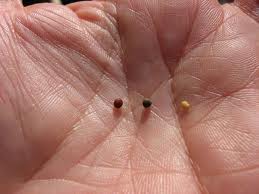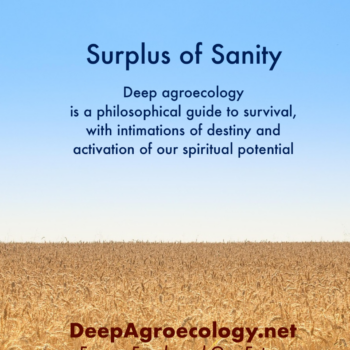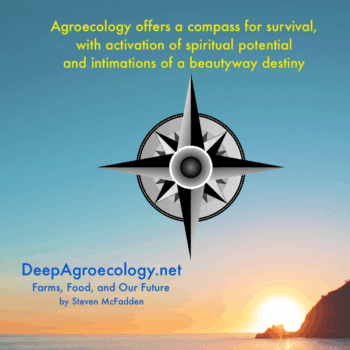I created this meme for my blog at The Call of the Land and felt it was also worth sharing with visitors to this associated Chiron Communications blog.

I created this meme for my blog at The Call of the Land and felt it was also worth sharing with visitors to this associated Chiron Communications blog.

Three seed ideas were among the many elements that underlie the actions of the first CSA farmers who in 1985-86 established new ways of farming in America. Those ways have emerged in subsequent seasons to yield as many as 10,000 contemporary community supported farms (CSAs) in cities, suburbs, towns, villages and churches across the land.

Photo by Maggie Mehaffey
The CSA model has proven to be a natural for adaption and innovation. Many latter-day CSAs, however, have overlooked or bypassed some of the seed ideas as they have established a wide range of variations on the CSA theme. Yet the seeds of the initial CSAs remain viable, perhaps even more so in our era of profound global change. They were explored in the book on CSA that I authored with Trauger Groh, Farms of Tomorrow. And they are freely available to anyone who chooses to cultivate them.
Alice Bennett Groh is part of the founding group for the Temple-Wilton Community Farm, in New Hampshire. In November, 2014 when she spoke at a Peterborough Grange ceremony to honor CSA pioneers, she put her focus on three of the seed ideas that helped community farms to become established in the USA and to grow.
With eloquence and economy of language, she told of how her husband Trauger Markus Groh partnered with Anthony Graham and Lincoln Gieger to cultivate new thinking, and thereby to initiate their highly productive, economically sustainable, and environmentally radiant Biodynamic farm on rocky, rolling hills flanking the Souhegan River…
The rest of the story in follows freely on my blog for Deep Agroecology: The Call of the Land.
In this brief video clip, Chief Phil Lane shares his understanding of a key ancient teaching of the Americas: the reunion of the Eagle, Quetzal and Condor.
https://www.youtube.com/watch?v=6IDOFyv9Zdw

I’m pleased to announce the publication of a major new two-volume encyclopedia, Achieving Sustainability: Visions, Principles, and Practices (Macmillan). My chapter on Community Supported Agriculture (CSA) is among the many elements of this comprehensive resource.
 Sustainable development is essential to our future.
Sustainable development is essential to our future.
Designed to increase understanding, inform actions, enrich academic assignments, and enhance research, Macmillan’s Achieving Sustainability: Visions, Principles, And Practices is a reference work intended to meet the needs of students and educators in high schools, community colleges, and four-year colleges, as well as the interested layperson.
Aimed at readers who are not experts in the field, the material is relevant to courses in natural sciences, social sciences, and the humanities.
This title presents and analyzes the underpinnings of the multi-disciplinary concept of sustainability. A two-volume encyclopedia containing more than 130 signed entries, Achieving Sustainability covers economic and environmental ideas, as well as governance, demographic, and socio-cultural aspects of the concept.
 Community Supported Agriculture (CSA) is an agrarian movement that arose in America starting in the 1980s. In an era of general farm consolidation and industrialization, CSA has continued to develop. By now there are many thousands of farms and many hundreds of thousands of households networked directly with local farms.
Community Supported Agriculture (CSA) is an agrarian movement that arose in America starting in the 1980s. In an era of general farm consolidation and industrialization, CSA has continued to develop. By now there are many thousands of farms and many hundreds of thousands of households networked directly with local farms.
The initial vision of CSA arose in the context of wide recognition of the necessity for renewal of agriculture through its healthy linkage with the human community that depends on farming for survival. The vision united farmers and consumers in an agrarian relationship for the health of people and planet, and explicitly recognized the necessary stewardship of soil, plants, and animals: the essential capital of human cultures. CSA emerged as a web of relationships.
Recently I had an opportunity to engage in conversation about the movement and its future with two renowned CSA farmers: Jean-Paul Courtens of Roxbury Farm in New York, and Allan Balliett of Fresh and Local CSA in Shepherdstown, West Virginia.
My thanks to Allan for creating and hosting BDnow Podcast 017 (The Future of CSA), and to Jean Paul for sharing his experience and insight.
As it happens, I must demur on the matter of “foremost…philosopher,” which is a descriptor applied to me in the podcast. CSA farms arose as a community supported concept. “The idea of CSA was in the air in the late 1980s.” Many different people were contributing to the thoughts and practices, including Jan Vander Tuin, John Root, Jr., Andrew Lorand, Robyn Van En, Elizabeth Henderson, Anthony Graham, Lincoln Geiger, and Alice Groh. Trauger Groh – my coauthor on Farms of Tomorrow and Farms of Tomorrow Revisited – had a profound and eloquent grasp of farming and of the budding CSA vision. My role with CSA in those days, and ongoingly, has been not to philosophize, but rather to listen closely and then to write about what I learn.
#csa #organicfarmers #organic #agrarian
In the context of the rapidly changing farm and food environment, Norlightpress author Steven McFadden has written a greatly expanded 2nd edition of The Call of the Land: An Agrarian Primer for the 21st Century.
The new edition is an effective way for people to learn about and to teach food security. It’s loaded with model after model of ways for families, neighborhoods, communities, schools, and churches to meet the challenge of caring for the land and providing an ample supply of clean food.
The acclaimed 1st edition of The Call of the Land was named one of the Best Books of 2009 by Food Systems Network NYC. The 2nd edition, far more comprehensive, is making a deeper, wider, and even more positive impression.
The Call of the Land is an excellent outreach tool for schools and farms to help educate and build community support. The more the community knows about what sustainable agrarian initiatives are doing for the land, for food, and for life, the more strongly the community will stand in support.
While no single remedy meets the many challenges to our food and farms, hundreds of positive, creative options are already in place. This book sets them out plainly and powerfully. Every household, library, church, and school should have a copy.
The Call of the Land illuminates the paths forward, revealing a range of models to establish a sustainable agrarian foundation for the fragile high-tech, digital-wave culture emerging so dynamically in our world. We have commenced a transition the likes of which few are prepared for, but to which we all can respond with intelligence.
The book gives voice to a swelling chorus of millennial agrarians who are working in cities, suburbs, countryside schools, churches, companies, and campuses to create a clean, secure, sustainable food system as a healthy foundation for the dynamic, high-tech culture that is emerging.
deep agroecology, #deepagroecology
A placeholder page; no need to put content here.






In Greek mythology the centaur named Chiron
strove to bridge daily life with spirit life.
Working in our era under the conceptual umbrella
of Chiron Communications,
I reach in similar directions as writer, teacher, storyteller.
I invite you to adventure in spirit via Odyssey of the 8th Fire
Engage the call of the land via Deep Agroecology
Prospect the archival depths of Chiron’s Cave
Check out my Youtube channel
Or ponder the possibilities described in my books
Excelsior ~ Steven McFadden
deep agroecology #deepagroecology
 Our Collective Odyssey: Song and Story for the Generations Arising
Our Collective Odyssey: Song and Story for the Generations Arising Musical Invocation: Odyssey of the 8th Fire
Musical Invocation: Odyssey of the 8th Fire Marvelous Meme Museum Makes Memories
Marvelous Meme Museum Makes Memories Podcast book review of Deep Agroecology (5 minutes)
Podcast book review of Deep Agroecology (5 minutes) Half a Century Later: My Odyssey in Journalism
Half a Century Later: My Odyssey in Journalism Key talk about farms and food 2025 – English y Español
Key talk about farms and food 2025 – English y Español Chiron’s Museum of Marvelous Memes – Gallery V
Chiron’s Museum of Marvelous Memes – Gallery V Odyssey of the 8th Fire accelerates in 2025
Odyssey of the 8th Fire accelerates in 2025 Our Collective Odyssey: Song and Story for the Generations Arising
Our Collective Odyssey: Song and Story for the Generations Arising Musical Invocation: Odyssey of the 8th Fire
Musical Invocation: Odyssey of the 8th Fire Marvelous Meme Museum Makes Memories
Marvelous Meme Museum Makes Memories Podcast book review of Deep Agroecology (5 minutes)
Podcast book review of Deep Agroecology (5 minutes)